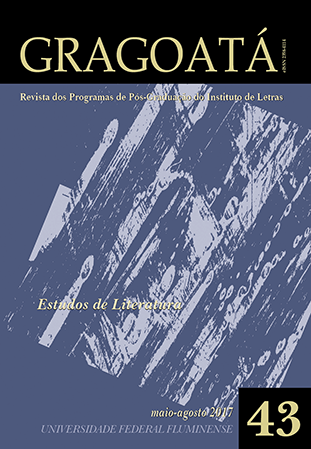Entre a aceitação e a negação: a construção literária do negro como modelo em O mulato
DOI:
https://doi.org/10.22409/gragoata.v22i43.33489Palavras-chave:
Aluísio Azevedo. Identidade. Estereótipos literários.Resumo
Aluísio Azevedo publica em 1881 o romance O mulato e inaugura o Naturalismo no Brasil (ABREU, 2013, p. 213; RIBEIRO, 1995, p. 205). A obra do autor, no entanto, pode ser considerada duplamente fundacional, ou pelo menos em uma segunda esfera igualmente fundacional, porque ela aborda e problematiza o nascimento da nação e de uma identidade que pudesse ser chamada de brasileira. Ao tratar da questão étnica nos últimos anos do sistema escravista no Brasil, o autor critica e rechaça a conduta discriminatória dos maranhenses, ao mesmo tempo em que deixa transparecer os próprios preconceitos em relação à população afrodescendente. Trata-se, portanto, de uma obra ambígua, na qual faz-se evidente o desejo de Azevedo de integrar a população negra na nação que se formava no final do século XIX e sua dificuldade em reconhecer valor na cultura afro-brasileira. O presente artigo tem como objetivo analisar a imagem do personagem afrodescendente partindo da premissa de que a alteridade e conceitos identitários sempre surgem em um contexto histórico e discursivo. Nas entrelinhas desse romance, buscaremos, assim, resposta para a caracterização ambivalente do personagem afro-americano como modelo para o futuro da nação.
---
DOI: http://dx.doi.org/10.22409/gragoata.2017n43a878.
Downloads
Downloads
Publicado
Edição
Seção
Licença
AUTORIZAÇÃO
Autores que publicam em Gragoatá concordam com os seguintes termos:
Os autores mantêm os direitos e cedem à revista o direito à primeira publicação, simultaneamente submetido a uma licença Creative Commons Atribuição 4.0 Internacional (CC BY 4.0), que permite o compartilhamento por terceiros com a devida menção ao autor e à primeira publicação pela Gragoatá.
Os autores podem entrar em acordos contratuais adicionais e separados para a distribuição não exclusiva da versão publicada da obra (por exemplo, postá-la em um repositório institucional ou publicá-la em um livro), com o reconhecimento de sua publicação inicial na Gragoatá.
A Gragoatá utiliza uma Licença Creative Commons - Atribuição CC BY 4.0 Internacional.











